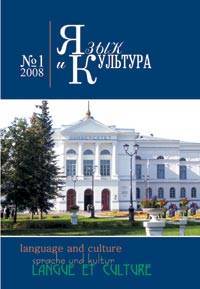Professional competence shaping of students through phraseology of biblical etymology
The paper deals with the issues of development of professional competence with the students of philology, religious and cultural studies, which in our opinion, suggests not only the transference of philological knowledge to the students and knowledge about the values and ideals of all-human and national culture but also: a) development of socially important features such as the sense of duty, tolerance, kind-heartedness, mercy, compassion, belief in good-naturedness of a person; b) development of the social position of the student, patriotism, sense of personal and collective responsibility; c) development of skills of interpersonal communication, of socially accepted and socially active behaviour. Biblical phraseology of the language under study may play an active and essential part in this respect. The reason for that effect is seen in the fact that biblicisms, having accumulated people's wisdom, present the treasure of moral and spiritual values, which have been tested by the social experience, i.e. by the lessons extracted from the lives of many generations through the empirical way. Shaping of philological competence takes place in the process of teaching that consists of three levels: informational, reproductive and productive ones, which together with general and cultural competences makes up professional competence of students. In Introduction, alongside with the indication of the purpose, material and methods of the research, the author's attention is paid to such quality of modern education as effectiveness, and in this connection the need of transition to the organization of educational process in line with the personal focused and competence-based focused paradigm is emphasized. At the same time education aims at obtaining the expected results in the form of competences - the list of which is provided in work - allowing to apply them during the whole life of the specialist. On the other hand, the author points out to the urgent need of restoration of a priority of upbringing for education that answers modern conception of quality of education as it has basic value for the development of society. In the research section the understanding of educational potential of biblical phraseology is made explicit. The author reasons - with the concrete contextual illustrations - the thought that ethical value, the emotional saturation and figurativeness of biblical phraseology have promoted its formation as an integral part of a number of functional styles of modern European languages, and have helped to gain indisputable discourse validity and the undoubted moral importance in training would-be teachers in a foreign language, and in improvement of their linguistic competences. At the same time, the author pays attention to the connotative asymmetry of biblical phraseology, which is significant for the choice of phraseological units in a discourse. Imparting experience with students of the Humanitarian institute, the author offers the project of a special course on studying of biblical phraseology in which distribution of hours to lectures, a practical training and seminar occupations is specified and time for classroom and independent occupations of students is dosed. The university lecturer will find recommendations to focus on the major themes, connected with formation of the necessary competences, such as: sources of replenishment of phraseological fund of modern English, a problem of the phraseological nomination, a systemacity problem in phraseology, problems of classification of biblical phraseology, a problem of symbolical reconsideration and variability of biblical phraseological units, issues of a structural-semantic and thematic outline of biblical phraseological units, a cultural background and moral and ethical potential of the English phraseology of biblical origin in work. Bearing in mind that amount of competences in scientific literature varies from several units to one and a half hundred, the author focuses the attention on formation actually professional, or philological, competences which as a result of the lingual-didactic analysis are exposed to the following rubrication: structural competences, variability competences, semantic competences, stylistic competences, functional competences. At the end of article results of pilot study are stated and the conclusions received during the work are formulated: a) about lingual-didactic demand of educational potential of phraseology of biblical etymology, b) about efficiency of the didactic module of the training of the English phraseology of biblical etymology based on the three levels as means of formation of professional competences of experts in philology, religious studies and cultural studies, c) about the discourse-communicative potential of phraseology of biblical etymology as an inexhaustible source for the intensification of formation of competences with students of Arts and Humanities.
Keywords
высшее образование, профессиональная компетентность, фразеологические единицы библейской этимологии, higher education, professional competence, phraseological units of biblical originAuthors
| Name | Organization | |
| Fedulenkova T.N. | Vladimir State University | fedulenkova@list.ru |
References

Professional competence shaping of students through phraseology of biblical etymology | Yazyk i Kultura – Language and Culture. 2017. № 40. DOI: 10.17223/19996195/40/7
